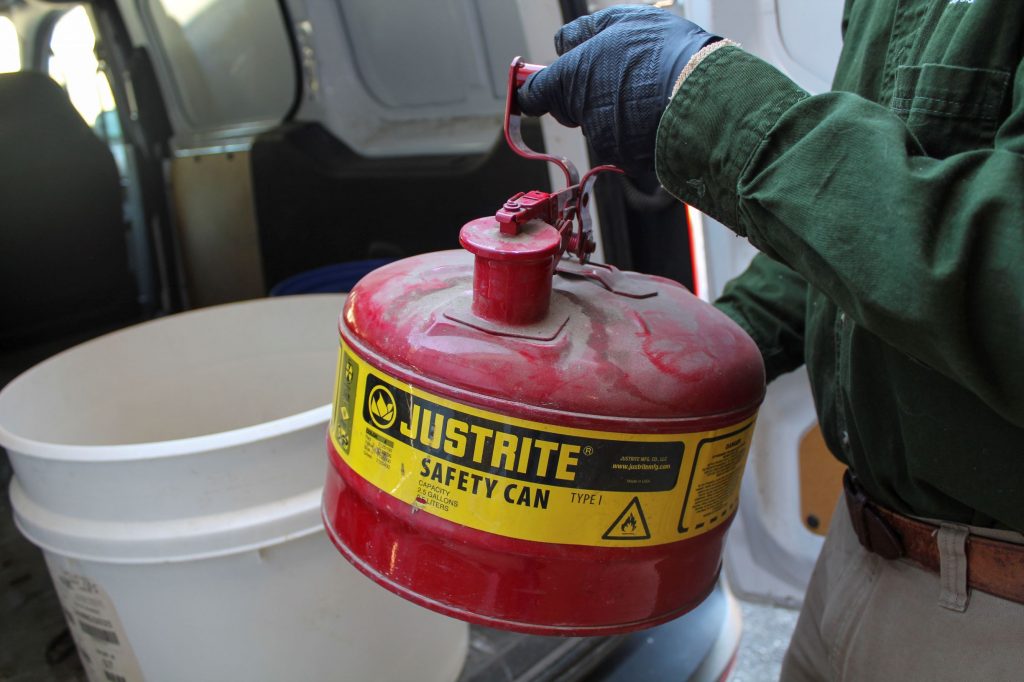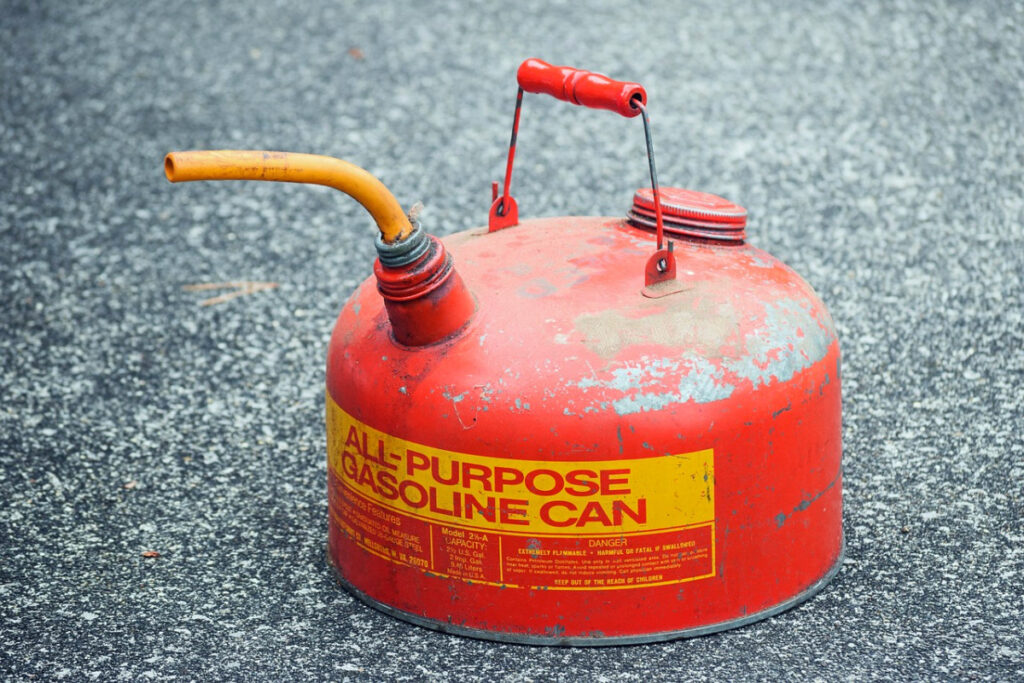Old gasoline is a hazardous material that poses serious risks if not disposed of correctly. Whether it’s been sitting in your lawnmower, car, or a plastic can in the garage, expired gas becomes unstable, flammable, and environmentally toxic. Improper disposal can lead to fires, health hazards, or even legal consequences.
In this comprehensive guide, we’ll walk you through how to dispose of old gas safely and responsibly. We’ll explore local laws, environmental considerations, and practical steps for various types of gas and storage. You’ll also find dedicated sections for gas cans, grills, gas/oil mixes, and even disposal methods at home—ensuring you have all the information you need to act safely and within regulations.
Understanding the Dangers of Old Gas
Gasoline degrades over time, especially when exposed to heat, oxygen, and moisture. Typically, gas begins to break down in as little as 30 days, becoming less volatile and more likely to damage engines.

- Old gas can form gums and varnishes, which clog fuel lines and injectors.
- It releases volatile organic compounds (VOCs), which are harmful to both humans and the environment.
- Improperly stored gas can ignite easily, especially in closed spaces like garages or basements.
Recognizing these dangers is the first step toward responsible disposal, helping you protect your health, property, and community.
Can You Use Old Gas? When to Dispose

Before disposing of gasoline, determine if it’s actually unusable:
- Check the smell: Sour or varnish-like odor indicates degradation.
- Observe the color: Fresh gas is clear or light amber. Old gas is darker.
- Mix with fresh fuel: In some cases, slightly degraded gas can be diluted with fresh gas (no more than 1:5 ratio) and used in lawn tools—not vehicles.
If the gas is more than six months old or smells bad, it’s best to dispose of it properly.
Where to Take Old Gasoline
The safest and most legal way to dispose of gasoline is to take it to a certified hazardous waste disposal facility.
- Many municipal recycling centers or waste collection agencies accept small amounts of gasoline.
- Use an approved container (such as a DOT-approved fuel canister) for transport.
- Some auto repair shops, fire departments, or hazardous waste events accept old gas.
Never dump gasoline down a drain, sewer, or onto the ground—it’s illegal and environmentally destructive.
Step-by-Step Guide to Disposing of Old Gas
- Transfer the gas into a clean, sealed, approved gas container.
- Label the container clearly as “Old Gasoline” or “Hazardous Waste.”
- Contact your local waste authority to find a designated drop-off point.
- Transport the gas safely in a ventilated vehicle (trunk with windows open).
- Never leave gas in your car unattended—always drop it off directly.
These steps ensure that you follow environmental regulations and avoid health hazards.

How to Dispose of Old Gas at Home Safely
While home disposal of gasoline is generally discouraged, there are a few controlled methods for very small quantities:
- Evaporation in a well-ventilated area (legal in some areas for drops or spills under 1 oz): Pour a small amount onto a non-porous surface outdoors and let it evaporate. Do not do this indoors.
- Use an absorbent like kitty litter or sawdust for small spills, then seal in a bag and dispose at a hazardous waste facility.
- Fuel burning (for slightly degraded gas): Use it in small amounts mixed with fresh fuel in lawnmowers or snow blowers.
Always check local laws first, as many municipalities prohibit any form of gasoline disposal at home.
How to Dispose of Old Gas Cans
Old gas cans—especially metal ones—pose their own risks due to corrosion or vapor leaks. Here’s how to handle them:
- Empty the gas can completely, then air it out in a safe, outdoor area.
- Rinse with soap and water, then let it dry for several days.
- If it’s plastic and clean, check if your recycling center accepts it.
- Metal gas cans can often be taken to a scrap metal facility.
- If the can is still contaminated or unusable, dispose of it at a hazardous waste site.
Never dispose of gas cans in your regular trash unless fully cleaned and permitted by local regulations.
How to Dispose of Old Gas Grill Fuel
Old gas grills often contain residual propane or natural gas tanks, which must be handled with care:
- Propane tanks should NEVER be thrown in the trash, even if empty.
- Return the tank to a propane supplier, hardware store, or hazardous waste facility.
- Old grills can be disassembled and recycled at metal scrap yards or curbside bulk waste pickup.
If your grill runs on natural gas, consult your gas utility provider to safely disconnect and decommission the unit.
How to Dispose of Old Gas Oil Mix
Mixed fuel—commonly used in chainsaws, trimmers, and two-stroke engines—requires specialized handling:
- Most hazardous waste centers accept gas-oil mixes, but they must be labeled properly.
- Do not attempt to burn or dilute it in vehicles or engines not designed for mixed fuel.
- Use spill-proof containers and ensure tight seals during transport.
Disposing of gas-oil mixtures at a certified facility prevents soil and water contamination.
Legal and Environmental Considerations
Gasoline is classified as a hazardous material under both U.S. EPA and international environmental regulations.
- Dumping or improper disposal can lead to fines from $500 to several thousand dollars.
- Contaminating soil or groundwater with fuel can result in long-term environmental damage and cleanup liabilities.
- Cities like New York, Los Angeles, and London have strict enforcement procedures.
Staying informed on local laws not only protects the environment but also keeps you legally compliant.
Can You Recycle Old Gas?
In some situations, old gas can be recycled, depending on contamination level and your location:
- Some hazardous waste facilities reclaim usable gas through filtering.
- Certain shops use distillation systems to purify old fuel for reuse in non-critical applications.
- DIY fuel filtration is not recommended due to fire risk and inconsistent results.
Only certified professionals should attempt to recycle gasoline, and even then, it’s often more practical to dispose of it safely.
Common Mistakes to Avoid
- Never pour gas down a drain or on the ground.
- Don’t mix old gas with household trash.
- Avoid storing expired gas indoors, especially near heat sources.
- Don’t assume “a little bit” of gas isn’t harmful—even small amounts are dangerous.
Safe disposal is about long-term health, not just short-term convenience.
How to Store Gas Properly to Avoid Waste
To prevent needing disposal in the first place:
- Use air-tight, fuel-approved containers with proper labeling.
- Store in cool, dry, ventilated areas away from heat or flames.
- Add fuel stabilizer if storing gas for more than 30 days.
- Rotate fuel usage and avoid stockpiling large quantities unless necessary.
Proper storage saves money, reduces risk, and minimizes environmental impact.
Final Thoughts: Responsible Gas Disposal Is Everyone’s Duty
Whether you’re dealing with a half-full gas can, an unused lawnmower, or a grill gathering dust, responsible fuel disposal is essential. Knowing how to dispose of old gas—along with the correct handling of cans, grills, and fuel mixes—can prevent fires, fines, and environmental harm.
Take the time to do it right. Follow local laws, use certified facilities, and always prioritize safety over convenience.
Frequently Asked Questions (FAQs)
Q1: Can I pour old gas down the drain or on the ground?
A: No. Never pour old gas down drains, sewers, or onto soil. It’s illegal, highly flammable, and harmful to the environment.
Q2: Where can I dispose of old gasoline safely?
A: Take it to a local hazardous waste facility, recycling center, or scheduled waste collection event. Contact your local municipality for drop-off locations.
Q3: How do I dispose of old gas at home?
A: Home disposal should only be for tiny amounts (e.g., small spills). Absorb with kitty litter or sawdust, seal in a bag, and bring to a hazardous waste site. Always check local laws first.
Q4: What should I do with an old gas can?
A: If it’s empty and clean, recycle it if accepted locally. If contaminated or damaged, bring it to a hazardous waste facility.
Q5: How do I dispose of old gas/oil mix from a lawn tool?
A: Label and transport it to a hazardous waste center. Do not pour it into engines not designed for mixed fuel or into the environment.
For More Update and Stories Visit: The Europe Times











